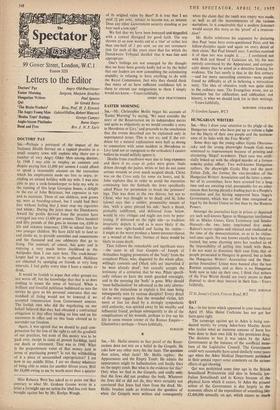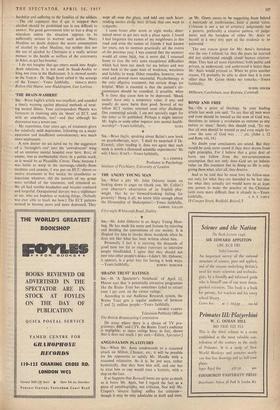QAT SIR,—In her letter which appeared in your issue dated
April 19, Miss Helen Cochrane has not got her facts quite right.
The campaign against qat in Aden is being con- ducted mostly by young Aden-born Muslim Arabs who realise what an immense amount of harm has been done to their own folk by this pernicious drug. The decision to ban it was taken by the Aden Government at the instance of the unofficial mem- bers of the Legislative Council. The Government could very reasonably have acted similarly some years ago when the Aden Medical Department published in their annual report some comments on the serious effects of qat chewing.
Qat was prohibited some time ago in the British Somaliland Protectorate and also in Somalia (ex- Italian Somaliland) and in Kenya because of the physical harm which it causes. In Aden the present action of the Government is due largely to the economic effects of the expenditure of something like £2,400,000 annually on qat, which causes so much
hardship and suffering to the families of the addicts. The old argument that if gat is stopped then alcohol 'should be prohibited too is not difficult to answer. No good government tries to ban a drug or stimulant unless the situation appears to be sufficiently serious to warrant such action. Many Muslims no doubt deplore the secret, consumption of alcohol by other Muslims, but neither this nor the use of alcohol by Christians is a really serious menace to the health or welfare of the community in Aden, as qat has become.
I do not imagine that gat enters much into Anglo- Arab relations. It is not used in Saudi-Arabia or Iraq, nor even in the Hadramaut. It is chewed mostly in the Yein:n : Dr. Hugh Scott called it 'the scourge































 Previous page
Previous page